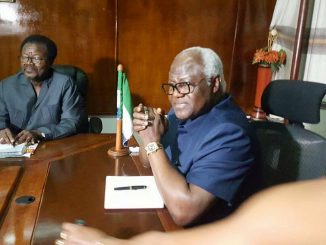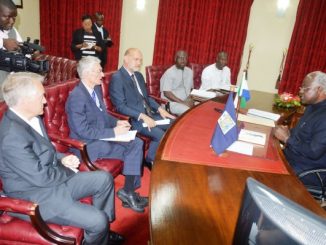By Ibrahim P. Sheriff
Tuesday April 18, 2006
This is the question that every Sierra Leonean both in the country and in the Diaspora keeps asking. The people are eager to ascertain themselves with this opaque reality because of the fact that the failed SLPP system is very confident with the election process and the manager of that process – NEC.
Whilst most of us in the Diaspora contemplates on the readiness of NEC to even register all Sierra Leoneans to vote during the 2007 elections; nether NEC nor the SLPP regime even consider the reformation of the NEC structure itself. To some of us, NEC is more important in our political process than anything else because it is NEC that finally manages the election process and reports to the people of Sierra Leone on who the next president of that country will be in 2007. Hence, we must start to check NEC itself to draw clear lines between logistical fitness to conduct the historical 2007 elections and its neutrality and genuineness in conducting that election. Oh yes, we are cautiously watching the distribution of constituencies – that is the political side of NEC even though it is raising concerns and threats of lawsuits by, for example Bonthe district. Now at least we can begin to figure out that NEC will be facing problems in the near future if it fails to remain clean.
Let us keenly concentrate on the logistical preparedness of NEC to conduct an election in a country that is seen in the eyes of the world as an example of true democracy in West Africa after years of brutal civil war. Let us concentrate on NEC as it conducts election in a country that endorsed a court that brings war leaders to justice. In other words, failure, or the sight of dishonesty and rigging in the coming election sends very awful signals to the rest of the world. So, in order to maintain the clean legacy of James Jonah as he cleanly managed the very fearful 1996 elections, NEC must be ready to put more logistics into place to effect not only voting, but proper registration of eligible voters. NEC must be mindful of the fact that the election in 1996 is going to be different from the 2007 election: more people are now enlightened than before; more people have realized the political manipulations that have led Sierra Leone to decades of retrogression; and above all, technology has brought in so much that can uncover any hidden agenda.
In order to avert all of these negative suspicions about NEC, I am suggesting that NEC saves its head by adopting a system that is clean and hassle-free. I know that part of the statistics that NEC is going to use in the coming elections is the recent census report. Well, that is fine; but I think that NEC must do its own registration and perhaps compare its final result to that of the census report. And in registering voters, NEC must change its registration culture from just individual home visits to a simultaneous establishment of voter registration centers throughout every corner of the country to reach out to every eligible voter in that country. One way NEC can do this is by utilizing technology. Though I agree that because of ignorance, NEC doesn’t realize the essence of network technology in easing its work or at least reaching out to all eligible voters. It’s simple. Let us discuss it in a plain language.
The world has changed a lot in the last couple of decades. Instead of simply dealing with local or regional concerns, many businesses now have to think about global markets and logistics. Many companies have facilities spread out across the country or around the world, and there is one thing that all of them need: A way to maintain fast, secure and reliable communications wherever their offices are.
Instead of using leased lines to maintain a wide area network (WAN) as a way to expand its private network beyond its immediate geographic area, NEC can create an Intranet using VPN (virtual private network) over a wide area network (WAN) to accommodate the needs of remote registrars, employees and distant offices. A typical VPN might have a main LAN at the NEC headquarters, other LANs at remote offices or facilities and individual users connecting from out in the field. Basically, a VPN is a private network that uses a public network (usually the Internet) to connect remote sites or users together. Instead of using a dedicated, real-world connection such as leased line, a VPN uses “virtual” connections routed through the Internet from the NEC’s private network to the remote site or registrars and employees.
From the above analysis, the questions arise: Why do we need this sophisticated technology in a developing country like Sierra Leone? How easy it is going to be for registrars and other employees to understand the proper use of this technology? What is going to be on this network that will be used by the registrars and employees? Well, we must not be scared by the sophistication of the technology to think that we are incapable of affording it. To answer those questions – first, this network is needed because NEC will be able to easily reach out to voters by establishing voter registration centers where computer devices such as Personal Digital Assistants (PDAs), Laptops and even desktops with remote access capabilities can connect directly to the servers at the private local area network (LAN) at the NEC headquarters. This way, NEC will avoid the duplication of voters registered and at the same time make voter registration sites easily accessible to the voters.
NEC is to create a secured database with backup copies of the database in an unknown location to the public into which all voter registration information is entered and queried for specific information. Let say an eligible voter who registered before at voter registration location A and comes to location B to register again will be spotted by querying the database to tell whether such individual registered before at any location; or the database will not even permit any re-registration of such individual into the system because each voter will be assigned a security number. Added to this system will be human interface software that will interact with users so that mistakes and errors are not imminent. Security against hackers or spammers should not be any concern as VPN uses secured remote access through encryption of data before transmission.
NEC will hence set up let say four remote branch locations in the four regions of Sierra Leone that will be joined in a single private network – this will be an Intranet VPN which will be password-protected. Let us take a look at this network design below:




Leave a Reply